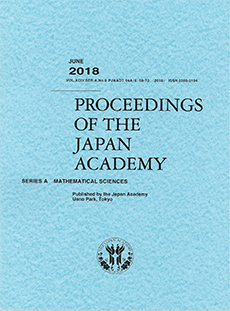Abstract
The function $f_{\alpha}(z) = \bigl( \{(1+z)/(1-z)\}^{\alpha} - 1 \bigr) / (2\alpha)$ with a complex constant $\alpha \ne 0$ is not univalent in the disk $U = \{|z| < 1\}$ if and only if $\alpha$ is not in the union $A$ of the closed disks $\{|z + 1| \leqslant 1\}$ and $\{|z - 1| \leqslant 1\}$. By making use of a geometric quantity we can describe how $f_{\alpha}$ ``continuously tends to be'' univalent in the whole $U$ as $\alpha$ tends to each boundary point of $A$ from outside.
Citation
Shinji Yamashita. "Nonunivalent generalized Koebe function." Proc. Japan Acad. Ser. A Math. Sci. 79 (1) 9 - 10, Jan. 2003. https://doi.org/10.3792/pjaa.79.9
Information





